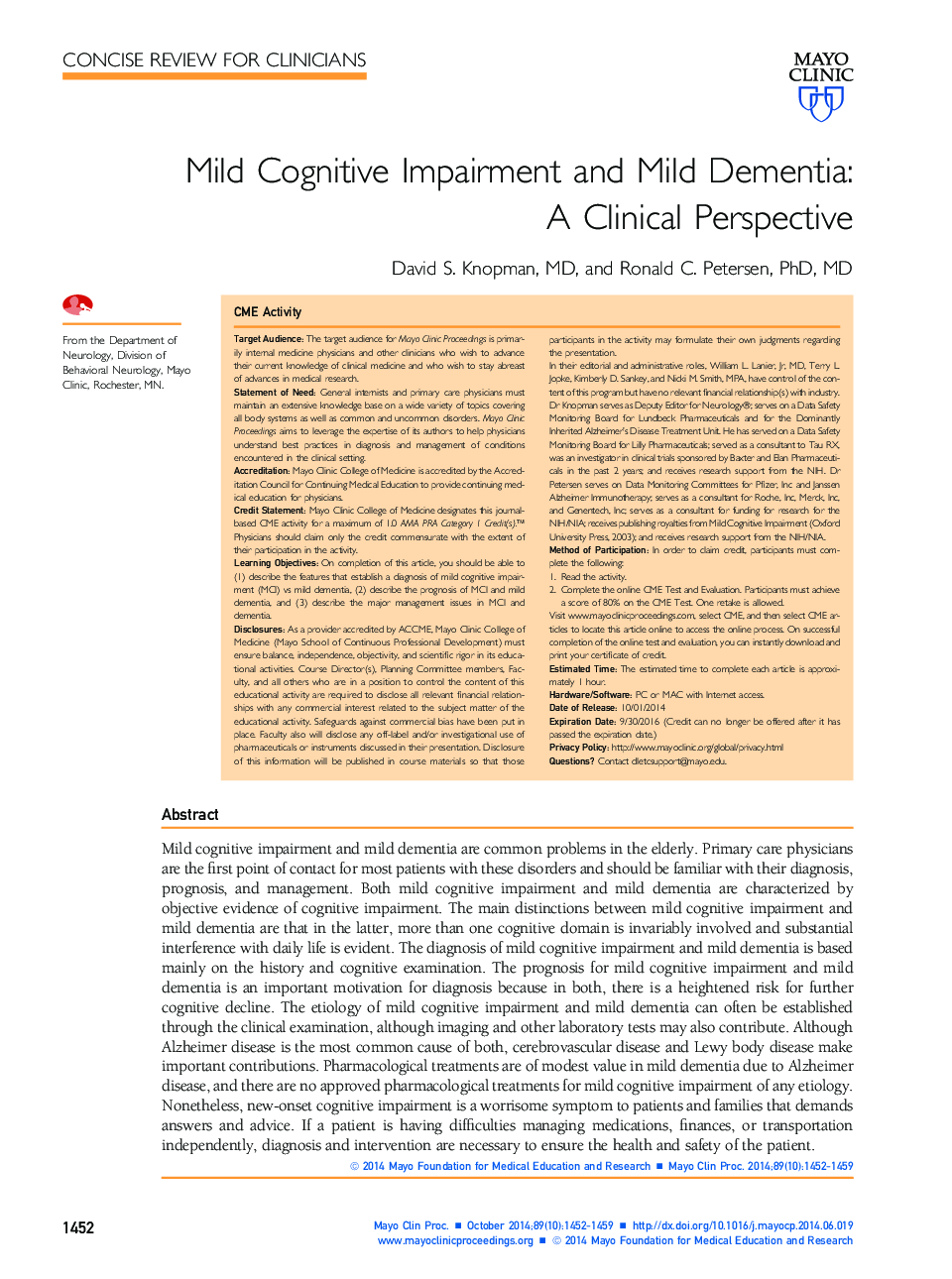| کد مقاله | کد نشریه | سال انتشار | مقاله انگلیسی | نسخه تمام متن |
|---|---|---|---|---|
| 10165729 | 1180249 | 2014 | 8 صفحه PDF | دانلود رایگان |
عنوان انگلیسی مقاله ISI
Mild Cognitive Impairment and Mild Dementia: A Clinical Perspective
ترجمه فارسی عنوان
اختلال شناختی خفیف و دمانس خفیف: چشم انداز بالینی
دانلود مقاله + سفارش ترجمه
دانلود مقاله ISI انگلیسی
رایگان برای ایرانیان
کلمات کلیدی
ترجمه چکیده
اختلال شناختی خفیف و زوال عقل خفیف مشکلات رایج در سالمندان است. پزشکان مراقبت های اولیه اولین نقطه تماس برای اکثر بیماران مبتلا به این اختلالات هستند و باید با تشخیص، پیش آگهی و مدیریت آنها آشنا باشند. هر دو اختلال شناختی خفیف و زوال عقل خفیف با شواهد عینی از اختلالات شناختی مشخص می شود. تمایز اصلی بین اختلالات شناختی خفیف و زوال عقل خفیف، این است که در گذشته، بیش از یک دامنه شناختی به طور پیوسته درگیر است و دخالت قابل ملاحظه ای در زندگی روزمره مشهود است. تشخیص اختلال شناختی خفیف و زوال عقل خفیف بر اساس تاریخ و معاینه شناختی است. پیش آگهی اختلال شناختی خفیف و دمانس خفیف یک انگیزه مهم برای تشخیص است، زیرا در هر دو، خطر ابتلا به کاهش بیشتر شناختی وجود دارد. علت اختلال شناختی خفیف و زوال عقل خفیف اغلب می تواند از طریق معاینه بالینی ایجاد شود، اگر چه تصویربرداری و سایر آزمایش های آزمایشگاهی نیز ممکن است کمک کند. اگر چه بیماری آلزایمر شایع ترین علت هر دو بیماری است، بیماری های مغزی و بیماری لووی، کمک زیادی می کند. درمان های دارویی در معنی دمانس ملایم به علت بیماری آلزایمر با ارزش متوسط هستند و درمان های دارویی مورد تایید برای اختلال شناختی خفیف هر نوع علت وجود ندارد. با این وجود، اختلال شناختی تازه شروع علائم نگران کننده بیماران و خانواده هایی است که نیاز به پاسخ و مشاوره دارند. اگر بیمار مشکلات مدیریت داروها، امور مالی یا حمل و نقل را به طور مستقل، تشخیص و مداخله برای حصول اطمینان از سلامت و ایمنی بیمار لازم باشد.
موضوعات مرتبط
علوم پزشکی و سلامت
پزشکی و دندانپزشکی
کاردیولوژی و پزشکی قلب و عروق
چکیده انگلیسی
Mild cognitive impairment and mild dementia are common problems in the elderly. Primary care physicians are the first point of contact for most patients with these disorders and should be familiar with their diagnosis, prognosis, and management. Both mild cognitive impairment and mild dementia are characterized by objective evidence of cognitive impairment. The main distinctions between mild cognitive impairment and mild dementia are that in the latter, more than one cognitive domain is invariably involved and substantial interference with daily life is evident. The diagnosis of mild cognitive impairment and mild dementia is based mainly on the history and cognitive examination. The prognosis for mild cognitive impairment and mild dementia is an important motivation for diagnosis because in both, there is a heightened risk for further cognitive decline. The etiology of mild cognitive impairment and mild dementia can often be established through the clinical examination, although imaging and other laboratory tests may also contribute. Although Alzheimer disease is the most common cause of both, cerebrovascular disease and Lewy body disease make important contributions. Pharmacological treatments are of modest value in mild dementia due to Alzheimer disease, and there are no approved pharmacological treatments for mild cognitive impairment of any etiology. Nonetheless, new-onset cognitive impairment is a worrisome symptom to patients and families that demands answers and advice. If a patient is having difficulties managing medications, finances, or transportation independently, diagnosis and intervention are necessary to ensure the health and safety of the patient.
ناشر
Database: Elsevier - ScienceDirect (ساینس دایرکت)
Journal: Mayo Clinic Proceedings - Volume 89, Issue 10, October 2014, Pages 1452-1459
Journal: Mayo Clinic Proceedings - Volume 89, Issue 10, October 2014, Pages 1452-1459
نویسندگان
David S. MD, Ronald C. PhD, MD,
